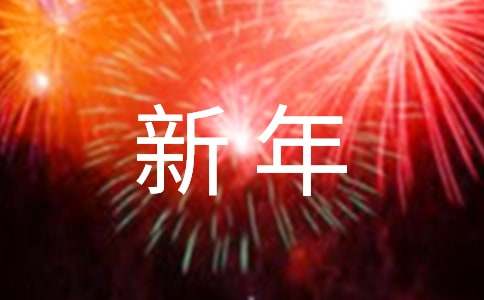關(guān)于2015新年的英語(yǔ)作文
Chinese New Year or Spring Festival is the most important of the traditional Chinese holidays. It is sometimes called the "Lunar New Year" by English speakers. The festival traditionally begins on the first day of the first month (Chinese: 正月; pinyin: zhēng yuè) in the Chinese calendar and ends on the 15th; this day is called Lantern Festival. Chinese New Year's Eve is known as chú xī. It literally means "Year-pass Eve".

Chinese New Year is the longest and most important festivity in the Lunar Calendar. The origin of Chinese New Year is itself centuries old and gains significance because of several myths and traditions. Ancient Chinese New Year is a reflection on how the people behaved and what they believed in the most.
Celebrated in areas with large populations of ethnic Chinese, Chinese New Year is considered a major holiday for the Chinese and has had influence on the new year celebrations of its geographic neighbors, as well as cultures with whom the Chinese have had extensive interaction. These include Koreans (Seollal), Tibetans and Bhutanese (Losar), Mongolians (Tsagaan Sar), Vietnamese (Tết), and formerly the Japanese before 1873 (Oshogatsu). Outside of Mainland China, Hong Kong, Macau, and Taiwan, Chinese New Year is also celebrated in countries with significant Han Chinese populations, such as Singapore, Indonesia, Laos, Malaysia, the Philippines, and Thailand. In countries such as Australia, Canada and the United States, although Chinese New Year is not an official holiday, many ethnic Chinese hold large celebrations and Australia Post, Canada Post, and the US Postal Service issues New Year's themed stamps.
Within China, regional customs and traditions concerning the celebration of the Chinese new year vary widely. People will pour out their money to buy presents, decoration, material, food, and clothing. It is also the tradition that every family thoroughly cleans the house to sweep away any ill-fortune in hopes to make way for good incoming luck. Windows and doors will be decorated with red colour paper-cuts and couplets with popular themes of “happiness”, “wealth”, and “longevity”. On the Eve of Chinese New Year, supper is a feast with families. Food will include such items as pigs, ducks, chicken and sweet delicacies. The family will end the night with firecrackers. Early the next morning, children will greet their parents by wishing them a healthy and happy new year, and receive money in red paper envelopes. The Chinese New Year tradition is a great way to reconcile forgetting all grudges, and sincerely wish peace and happiness for everyone.
Although the Chinese calendar traditionally does not use continuously numbered years, outside China its years are often numbered from the reign of Huangdi. But at least three different years numbered 1 are now used by various scholars, making the year 2009 "Chinese Year" 4707, 4706, or 4646.
中國新年的春節是最重要的中國傳統節日。它有時(shí)被稱(chēng)為“春節”英語(yǔ)。傳統節日開(kāi)始的第一天的第一個(gè)月(中國:正月;拼音:zhēng曰)在中國的日歷和15日結束,這一天被稱(chēng)為元宵節。中國新年前夜被稱(chēng)為楚xī。它的字面意思是“Year-pass夏娃”。
中國新年是最長(cháng)和最重要的節日農歷。春節的起源本身是世紀老和收益意義,因為幾個(gè)神話(huà)和傳統。古老的中國新年是一個(gè)反思人的行為舉止和他們最相信的東西。
慶祝在人口眾多的地區的華人,中國的新年被認為是一個(gè)重大節日為中國和有影響地理鄰國的新年慶祝活動(dòng),以及文化與中國有廣泛的交互。這些包括韓國人(Seollal),西藏和不丹(Losar),蒙古人(Tsagaan Sar)、越南(Tết),和以前的日本在1873年之前(Oshogatsu)。以外的中國大陸、香港、澳門(mén)和臺灣,中國的新年也是慶祝重要的漢族人口的國家,如新加坡、印度尼西亞、老撾、馬來(lái)西亞、菲律賓和泰國。在國家,如澳大利亞、加拿大和美國,盡管中國的新年不是一個(gè)官方節日,許多華人舉行大型慶祝活動(dòng)和澳大利亞,加拿大郵政和美國郵政服務(wù)問(wèn)題新年為主題的郵票。
在中國,地方習俗和傳統的慶祝中國新年相差很大。人們要將自己的錢(qián)買(mǎi)禮物,裝飾、材料、食品、和衣物。也是每個(gè)家庭的傳統徹底打掃房子掃除任何厄運,希望為傳入的好運氣。將門(mén)窗用紅色剪紙和對聯(lián)裝飾流行的主題“幸福”,“財富”和“長(cháng)壽”。春節前夕,晚餐是一個(gè)盛宴,家庭。食品等項目將包括豬、鴨子、雞和甜的美味佳肴。家庭將鞭炮的夜晚結束。第二天一早,孩子們問(wèn)候他們的父母,祝他們健康,新年快樂(lè ),在紅紙信封和接收錢(qián)。中國新年的傳統是一個(gè)偉大的方式調和忘記所有的怨恨,并衷心祝愿和平和幸福。
盡管中國日歷傳統上不使用連續數年,中國以外的其年常常編號從黃帝的統治時(shí)期。但至少三年不同編號1現在使用的各種學(xué)者,2009年“中國年”4707年,4706年或4646年。
【新年的英語(yǔ)作文】相關(guān)文章:
新年英語(yǔ)作文01-14
英語(yǔ)作文新年09-08
新年的英語(yǔ)作文09-08
英語(yǔ)新年作文08-20
新年英語(yǔ)作文01-12
新年英語(yǔ)作文 新年寄語(yǔ)09-08
英語(yǔ)作文新年打算12-19
新年元旦英語(yǔ)作文12-31
中國的新年英語(yǔ)作文02-20